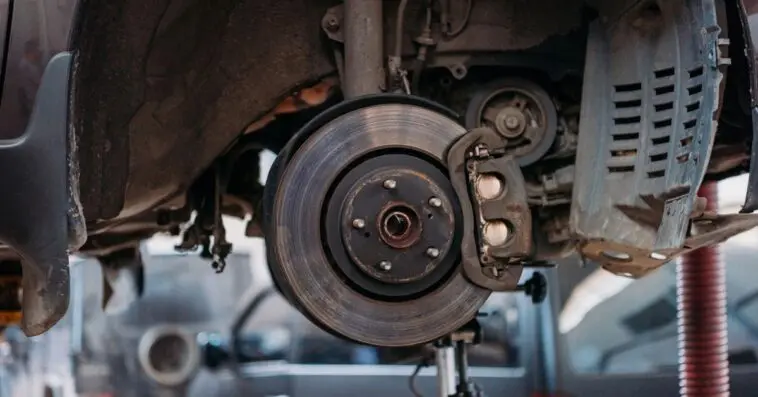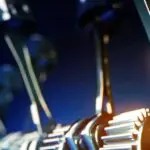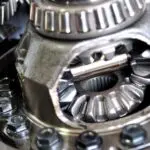Hearing sounds while driving isn’t a big deal, but what if you start hearing an awful grinding sound when you hit the brakes?
Many of us may disregard this, but it could land you in trouble. The question here is what that grinding sound actually means or what causes it to occur.
So, why are my brakes grinding? In all probability, it’s because the rotor disc comes in contact with the caliper. Mostly this happens due to extreme wear of the brake pads.
But, if your car is generally parked in a humid area, it’s likely to build light rust, causing the squeaking sound.
TABLE OF CONTENTS
How Does The Brake System Work?
Before proceeding, you must first understand how a brake system works. Pressure on the brake pedal moves the brake fluid to the caliper.
The caliper, in turn, gently presses the brake pads against the rotor. The resistance offered by the brake pads on either side of the rotor discs within the braking unit causes the wheel to stop, and in turn, the car to come to rest.
If the brake pads wear out, the exposed metallic plates will rub against the metallic wall of the rotor, causing a grinding effect. This slows down the functionality of the brake and eventually leads to a brake failure.
Grinding Noise When Braking? Here’s Why!
When your brake pads are thinner than the approved thickness, they will begin to squeal whenever you press the brake pedal.
This is what we call brake scrubbing, and it indicates that it is time to change the brake pads. It quickly changes to a grinding noise if you ignore this caution.
Suppose your brakes make a sharp grinding noise while braking; the brake disc and caliper are most likely rubbing together.
The sound is most often heard as you come to a complete stop, but you can also hear it when you step on the brake pedal.
The easiest way to fix this problem is to replace your brake pads as soon as possible, but you might also need to replace your discs or rotors. (Here’s how you do it!)
Usual Suspects Of Brake Grinding
- Brake Pads: With the wear of brake pads, the surfaces that should generate friction do not function well. This makes the metal plates come in contact with the rotor making the grinding noise. If you do not take immediate steps, it could potentially damage the rotor in the process.
- Brake Rotors: The brake rotor discs become grooved and damaged over time. It can also become warped in some cases. You should plan to perform a brake service every 20,000 miles or so, including at least pads and possibly rotors.
7 Reasons For Brake Grinding
1. Worn-Out Brakes Pads
If you notice your brakes grinding while stopping or slowing down, the issue is most likely with your brake pads.
To ensure proper and efficient operation, the brake pads must be of a certain thickness.
Your brakes wear and tear over time, and as a result of this deterioration, the thickness of your brake pads decreases, and your brakes begin to grind.
2. Increased Friction Between Rotor And Caliper
When you press the brake pedal, you’ll likely hear a loud grinding sound which is caused due to the rotor and caliper coming in contact.
This means either the brake pads are completely worn out or are wearing down, and it’s time to change them.
The repair can be pretty expensive as it wears out both the rotor disc as well as the calipers or even the brake discs.
If you hear the brakes grinding, pull over the vehicle and instead call a professional to have a look.
3. Debris In The Caliper
If the grinding sound is constant while driving, something may be caught within the calipers. It can be microscopic, like fine particles of sand, or pebbles, and other debris.
Debris stuck within the braking unit enhances the wearing of the brake pads due to increased friction. So, you should routinely service the braking system.
4. Grinding Sound On A Sudden Stop
When you apply the brakes for a sudden stop, in this case, the grinding could be caused by your car’s anti-lock braking system.
This works by pumping the brakes to maintain control and balance. You can hear a grinding sound as a result of this.
5. Rust And Corrosion
As we know, the presence of moisture on any ferrous metallic surface is prone to rust. Whenever you wash your car, wipe dry the brake discs and the metallic caliper assembly.
Otherwise, when the wheels are in motion, you are likely to hear weird noises due to uneven surfaces coming in contact with each other.
This unevenness is caused due to the presence of rust on the metallic discs, which in turn damages the rubber component of the brake pads when you apply brakes.
After inspecting the braking system, if you do not find any visually observable glitch, you can perform brake checks.
6. Worn Rotor Disc
A worn rotor disc may cause irregular rambles and vibrations. It also makes a grinding sound. Flat rotor discs develop irregular shapes as a result of wear and tear, causing grinding noise.
7. Dry Rotor-Disc And Brakes
Lack of proper lubrication of the rotor disc and brakes will make them, and when you press the brake, it will begin to make a grinding noise.
To get rid of this, you must lubricate it properly. This will allow the disc and brake to operate smoothly, and your problem will be resolved.
When Should You Consult A Professional To Look At Your Brakes?
For new drivers, it can be challenging to understand whether the noise coming from your brakes is a natural mechanical sound or some severe underlying failure.
Apart from sharp ears and some common sense, you’ll need to do a slight bit of detective work to understand if the noise is serious or simply an annoyance.
So, when do you need to consult a professional?
Case 1. Dripping Fluid
The very first thing to check should be if the car is leaking brake fluid. You should be looking for small puddles or stains of fluid (it won’t look like oil or coolant).
It will be a brownish stain, slightly slimy in consistency. Do not confuse brake fluid with motor oil, as they almost feel the same except for the sliminess.
If you find any such leakage, you need to consult a car mechanic to fix this.
Case 2. Squealing Noise
Although you can consider low-frequency squeals as a common problem due to various reasons that are not serious, you should be alert about high-frequency squealing noises.
If the high-frequency squealing noise is loud and consistent, there is no other way but to check with a professional.
And you should be quick about it. During this time, avoid taking the car out as there may be chances of brake failure.
Be vigilant when the professional checks your vehicle. He should be checking the brake shoes, calipers, and master cylinder.
Related topic: Why Are My Brakes Squealing With New Brakes?
Case 3. Metal Scraping Sound
If you hear the awful metal-on-metal sound from your brakes, never ignore it.
In most cases, this means that the brake pads are completely worn out, and the brake calipers are scraping against the rotor discs to stop your car.
Due to the absence of brake pads, the braking distance increases drastically and can cause severe accidents at higher speed, being unable to stop the car.
This is a serious problem and will not take more than two to three occurrences to ruin the car’s braking system completely.
Ideally, get your car towed to a professional for immediate check and altogether avoid driving the car under any circumstance.
How Much Does It Cost To Fix Brake Grinding?
Even if you hire a professional, repairing brakes is relatively inexpensive. It should cost you somewhere between $200-250.
Many people will do the work at home because it isn’t rocket science, but you won’t go broke for those who are too busy or have limited space.
Frequently Asked Questions (FAQs)
Q1. Why Does My Car Still Produce Loud Grinding Noise Even After Replacing Brakes And Rotors?
It is possible if the springs and pins on the caliper are not correctly installed. Other reasons could include debris, stones, loose bolts, or even if the dust shield is bent during installation.
Q2. How Do I Know If Anything Is Wrong With The Braking System?
You’ll definitely hear scraping or squealing sounds indicating your brake system has run into some serious trouble.
Either there’s some foreign body lodged between the rotor and brake pads, or the components of the brake system are failing. It’s best to have a professional do a whole brake inspection.
Conclusion
If your brakes are grinding, consult a professional to understand the root cause and determine the course of action after.
Avoid using low-quality brake pads because they may contain metal slabs that can cause severe damage to the rotor wall. (Here’s the top-rated brake pads you can review!).
Choose high-quality brake pads to avoid brake grinding and to ensure a safe ride. I hope this article was helpful in resolving your issue.




